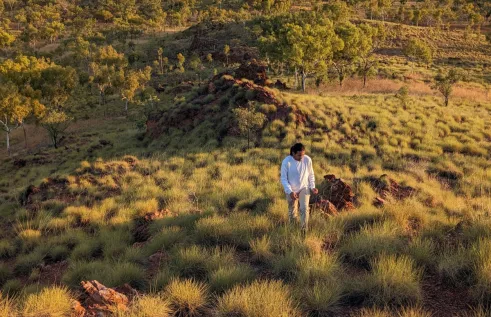We welcome prospective research students to undertake their research journey with the Faculty of Arts and Society.
Our researchers in the fields of humanities, social sciences, business, law and languages have national and international expertise in North Australia, Southeast Asia, the region and beyond. Faculty of Arts and Society staff can support PhD, Master by Research, and honours students in a range of specialisations.
Available postgraduate projects
If you’re interested in a project, please contact the supervisor listed.
If you've been unable to find a project you are interested in, you can use the researchers portal to find researchers from related fields.
Use one or two keywords to narrow down the list of researchers.
Each research profile will indicate if the researcher has the capacity to supervise.
Financial Assistance: Students must apply for a scholarship if they need financial support to undertake the research.
Building on Indigenous culture and language for school teaching and learning
Supervisors: Cris Edmonds-Wathen (contact: cris.edmonds-wathen@cdu.edu.au)
Suitable for: PhD
Project Location: Darwin
Project Summary
Preservation of linguistic identity is widely recognised by Indigenous groups as essential to the preservation of both cultural identity and technical, scientific, and environmental knowledge. The use of a language in formal schooling is one key factor in language maintenance.
The PhD scholar will investigate how an Indigenous language or languages from their context country or region) can be used in school education, investigating theoretical, policy and practical issues. The specific context of the scholar will play an important role in the shape and direction of the project, but questions for investigation might include:
- How does the policy environment of the context with respect to the use of Indigenous languages in education affect current practice?
- What affordances does a specific language or group of languages have for school education in a specific curriculum area? What language development work is required for implementing the teaching of a curriculum area in the language/s?
- How can the use of an Indigenous language currently used in basic or initial education be expanded into later years?
- What support do teachers need to teach curriculum areas in an Indigenous language?
- What are the similarities and differences in the context with those of Indigenous education in the Northern Territory (comparative study)? The candidate is also expected to contribute to developing theoretical perspectives on the relationship between language and school content knowledge in contexts of linguistic diversity. Proposals that focus on mathematics education are preferred; focus on other curriculum areas may be negotiated
Note: The candidate should either come from an Indigenous community (in their country or region) or have a close relationship with a suitable community that enables this research to be undertaken in a respectful, responsible and reciprocal manner. Prior studies in linguistics, as well as education, are greatly advantageous, as is being able to speak a target Indigenous language.
Identifying mathematical expression for teaching and learning mathematics in diverse Australian Indigenous languages
Supervisors: Cris Edmonds-Wathen (contact: cris.edmonds-wathen@cdu.edu.au)
Suitable for: PhD
Project Location: Darwin, other NT locations may be negotiated.
Project Summary
There is an exciting opportunity for a PhD scholar to work on a project that aims to improve the potential for delivering mathematics education in Australian Indigenous languages with the goal of improving the mathematical learning of Indigenous language-speaking students.
This project aims to identify the language structures required to develop mathematics registers in diverse Australian Indigenous languages. It will:
- systematically investigate the mathematical affordances of Australian Indigenous languages, and
- develop guidelines to identify and develop the language required to teach and learn school
- mathematics in Australian Indigenous languages.
The PhD scholar will investigate how an Indigenous language can be used in school mathematics education, working closely with a specific school and community, focusing on the early years of primary school. The candidate is also expected to contribute to developing theoretical perspectives on the relationship between language and school mathematics knowledge in contexts of linguistic diversity.
Note: The candidate should have prior studies in education or linguistics. It is advantageous if you either come from an Indigenous community or have a close relationship with a suitable community that enables this research to be undertaken in a respectful, responsible and reciprocal manner. Being able to speak an Indigenous language is also greatly advantageous.
Supporting Students in Writing Scientific Explanations in Years 11 and 12 Through Student-Generated Multiple Representations
Supervisors: Felicity McLure (contact: felicity.mclure@cdu.edu.au), Cris Edmonds-Wathen & Janice Crear.
Suitable for: Masters by Research, can be continued to PhD
Project Location: Alice Springs. However, the student could be located elsewhere in Australia
Project Summary
The Thinking Frames Approach has been shown to be a powerful strategy using student-generated multiple representations (verbal, pictorial and written) for supporting students in Grades 8-10 in writing complex and elaborated scientific explanations of phenomena. Teachers often express concern that students of Biology, Chemistry or Physics in Grades 11 and 12 also struggle to link chains of reasoning explaining cause and effect to explain scientific observations in tests and exams. This pilot project will adapt the Thinking Frames Approach to support students in senior high school in improving their written explanations and creating links with underlying scientific theories. The efficacy of such an approach will then be studied to determine the degree to which students' writing improves as a result of the TFA intervention.
Management of Teacher Education in the New Normal: A Comparative and Explorative Study
Supervisor: Stephen Bolaji, stephen.bolaji@cdu.edu.au
Suitable for: PhD
Project Location: Casuarina / International
Project Summary
Since late 2019, teacher education program among other sectoral areas of education has been profoundly disrupted due to COVID19. The disruptions have been widely expressed in the form of closure of schools, academic interruption, social distancing measures, and geographical and border restrictions for many international preservice students among many others (Casacchia et al, 2021; Cornier, et al, 2021; Vilchez, et al 2021; Carolan, et al, 2021). Despite several strategies developed to address some practical aspects of the teacher education programs, those strategies seem not to be devoid of pivots and consequences (Scotts, 2021). While the new normal has given a new direction to teacher education using technology and online spaces for delivery, the inequalities and lack of access remain an issue yet to be addressed. Management of teacher education programs is an issue of concern, especially with the incessant government policy pronouncement centred on lockdown, border closure, social distancing, and school closure for placement students. Thus, understanding how both staff and students can navigate this critical situation is a matter of interest in this study.
Note: Student will need a good understanding of literature, Education systems, and NviVo for Qualitative Data Analysis and Interview Design.
Integrating Transformative Curriculum Outcomes in a Literacy Class with the 'Reading for Emotion' Model Utilising Multi-Sensory Language Learning Strategies
Supervisors: Dr Ania Lian (contact: ania.lian@cdu.edu.au)
Suitable for: PhD
Project Location: Darwin, CDU Casuarina Campus
Project Summary
As academics continue quarrel about the best way to teach reading and writing, evidence in terms of which these discussions follow limits itself to understandings and models developed decades ago. The use of technology also remains unexplored largely due to the paradigms that dominate the field. Stifled and in the grip of the past, the field generates little, if any, new knowledge that would contribute to the theory of language and the practice of language teaching. In addition, the transformative focus of the new national curricula challenges educators to design models that integrate the skills and values they involve, without reducing those to itemised lists to be “taught” one by one. Formalised processes for designing such integrative curricula are missing that include, rather than ignore, evidence from theory and practice in order to further inform those. Furthermore, as evidenced in the study by Sudimantara (2021), in Indonesia, the currently mandated genre approach that utilised the Systemic Functional Grammar is not popular among the students and, more importantly, has come short in comparison with the Reading for Emotion model, where all students improved significantly while the SFL group received either lower or equal scores to those obtained in the pretest. The proposed study will address the points raised above and will conduct a quasi-experimental project to compare the effects of a multi-sensory learning model, with the well-established genre approach commonly taught in schools and university preparatory courses in Australia and around the world.
Note: The study can be conducted at any level of education and any country, Australia or Asia
Rethinking Reflective Teaching in Early Childhood Contexts to Build Stronger Connections Between Colleges of Education, the Local Teacher Community, and the Broader Community
Supervisors: Dr Ania Lian (contact: ania.lian@cdu.edu.au) and Georgie Nutton
Suitable for: PhD
Project Location: Darwin, CDU Casuarina Campus
Project Summary
Transformative learning outcomes that typify modern education curricula are also present in the Early Years Learning Framework. To enable the integration of these outcomes, the Australian government encourages teachers to engage in reflective practice whose objectives are specified in the Australian Professional Standards for Teachers and whose quality is assessed through the various audits that Early Childhood centres regularly undergo. As demonstrated in the context of a study that has recently concluded at CDU, EC teachers benefit from professional development activities. However, professional development requires “time on task” that, despite best efforts, is not available to practising teachers sufficiently to formalise and test the processes and knowledge that these experiences generate. It has been observed that it is critical to rethink professional learning experiences. This proposal describes a qualitative study in the Early Childhood context that seeks to design and explore a professional development model from the perspective of its impacts on teacher expertise, motivation, and professional status. The study will review the different forms of professional learning that institutions provide, the expectations that inform those and the forms of professional recognition that they make available to teachers. The aim of the project is to contribute new insights to the ongoing objective of Australian education institutions to strengthen the connection between the Colleges of Education, the local teacher community and the broader community.
Note: The study can be conducted at any level of education and any country, Australia or Asia

PhD and Master by Research
Study with the Northern Institute through a PhD or MRes. We offer expert supervision and a unique research experience in Northern Australia. Build on your research foundations and make meaningful developments in your community or area of interest.
Find a scholarship, project & supervisor